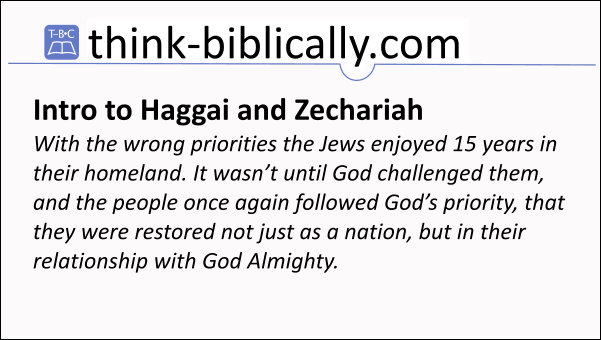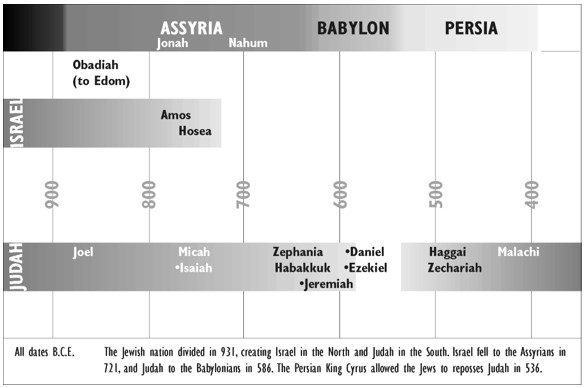By Tyson Thorne

Haggai is the first prophet to the returning exiles. A lot of significant history has passed to reach this point in Israel's life, including the end of the Babylonian Empire, the rise of the Persian Empire, the absence of a Jewish nation, and now the resurgence of Jewish nationalism and the beginnings of a national restoration. The chart below offers a timeline-like understanding of the significant events, and a chronological placement of both the major prophets (marked with an •) and the minor prophets. The prophets are divided as such not because some were "greater", but simply by the length of their writings.

There is far too much history to relate between the time of Habakkuk and Haggai (nearly 100 years of history!), and there are even a couple of rulers (Cambyses and Darius I, Persian kings) the Bible doesn’t even acknowledge. May it be sufficient to say that the Jews retained their national identity, unlike the other ancient kingdoms, because of their worship of YHWH. When the other nations, Canaan, Philistia, Egypt, etc. formed they also formed distinct religions, usually idolatry. Their religious practices helped to differentiate the varying kingdoms. When one nation conquered another, it was accepted that the conquering nations god had proved the strongest and the conquered peoples changed their allegiance. Not so the Jews, who maintained belief in their God even after they had been routed and taken captive by the Assyrians and Babylonians.
The Persian Empire, after integrating the know-how of the Assyrians, and the artistry of the Babylonians, found themselves increasingly challenged financially. The empire had conquered much of the known world, and there were no other nations to spoil and plunder. A new source of income had to be found quickly. It was then the Persians decided to “downsize.” Rather than have one people united under the empire, it would be better to have several vassal nation-states, each with their own economy. The first test group would have to be a people who had retained their national identity, the Jews. Hence the great return of 536.
Author & Date of Composition of Haggia & Zechariah
Both Haggai himself (1.1) and the priest Ezra identifies him as a prophet (Ezra, 5.1). The prophet Haggai has taken careful steps to date his messages (1.1, .15; 2.1, .10, .18, .20), 520 BC by the modern calendar. He is a prophet to the returned exiles of Judah.
Zechariah identifies himself as the grandson of Iddo, a priest who was in the first group to return from the exile (Nehemiah 12.4-.16). Zechariah, therefore, is another example of a priest become prophet. Zechariah worked alongside Haggai (Ezra 5.1 and 6.14) to encourage the people’s hearts after their stern warning from the Lord (Haggai1.1-.11) a couple months before. Hence, Zechariah’s prophecy is dated with Haggai’s around 520 BC.
The Book of Haggai
- God’s Warning to Judah, 1.1-.11
- Judah’s Reaction, 1.12-.15
- God’s Response, 2.1-.23
Once the Jews returned to their land, their first priority was to rebuild the temple of YHWH. Persian officials who were willing to put up with the kings edict (though they disagreed with it), saw the reconstruction project as a waste of time and resources. Threatened with legal injunctions, the Jews stopped the construction and began to rebuild the rest of the nation. This went on for 15 years before God said, “Enough! Finish my temple.” God saw the Persian threat as an excuse to enjoy the good life, rather than a reason to discontinue the building project.
This first word from the Lord came from Haggai, and it’s effect was evidenced by the people’s renewed efforts in completing the temple project, which took four more years. Haggai’s message was more than a command to re-engage the building program, however, he carried with it a stern warning for continued disobedience. The people heard and obeyed God’s word, for which they were rewarded by the King of Kings, who took care of the threats and lawsuits and once again dwelt among his people.
If this building program of old had a slogan, it would have to be, “Consider Your Ways.” With the wrong priorities the Jews enjoyed 15 years in their homeland. It wasn’t until God challenged them, and the people once again followed God’s priority, that they were restored not just as a nation, but in their relationship with God Almighty. Such an event draws a question to every reader in every age, “Have I considered my ways? What are my priorities?”
The Book of Zechariah
- Introduction, 1.1-.6
- Zechariah’s Night Visions, 1.7-6.8
- Zechariah’s Four Messages, 7.1-8.23
- Zechariah’s Two Burdens, 9.1-14.21
The first six verses of Zechariah call the people to remember their recent history. They and their forefathers had suffered through the exile because of their sin. Now, providing the people return to YHWH rather than their sins, Judah would once more experience God’s blessing.
The Night Visions
One sleepless night Zechariah received all eight of the following visions:
• The Vision of Gentile Domination
• The Vision of the Four Horns and the Four Craftsmen
• The Vision of the Man with the Measuring Line
• The Vision of the Cleansing of the Priesthood and Israel
• The Vision of the Golden Lampstand and Two Olive Trees
• The Vision of the Flying Scroll
• The Vision of the Woman in the Basket
• The Vision of Four Chariots and the High Priest’s Crowning
Each vision is highly symbolic and reveals much regarding Israel’s future. For instance, the first, fourth and final visions tell of Israel’s subjection to the Gentile nations, with the assurance that one day they would be honored by all peoples of the Earth; that God had already begun a great work to restore righteousness to Israel, her priests, and all the people of Earth; and prophecy regarding the judgment of the Earth at the end of time, including the crowning of the high priest, seen as Joshua in the vision but which will undoubtedly be the Great High Priest Jesus Christ (Hebrews 4.14).
Question and Answer
As the Jews now enjoyed their freedom as a nation, many wondered if they should keep the Fast of Deputation, a custom that had begun during the exile to remember the fall of Jerusalem (which had happened in May of 586 BC). Zechariah rebuke’s them for their ignorance; it is not so important to remember the day of Jerusalem’s fall as it is to remember why she fell. If the people would keep themselves from sin all her days of fasting would be turned into celebrations!
Two Burdens
This section of the book details future days for the Jews and the ultimate triumph of God’s kingdom. The first burden focuses on the Messiah’s first advent (among the peoples of the first century AD), while the second burden focuses on the Messiah’s second advent (which is yet to come).
All in all, Zechariah follows the pattern set forth by the Major Prophets, telling of Daniel’s Times of the Gentiles, the tribulation period, the coming of Messiah and the era of God’s kingdom. How comforting these words must have been to a broken people starting over. How gracious God is to encourage his people, after he had them down-trodden. How holy is God, who sets up rulers and powers and every authority under heaven to accomplish his purposes. Mighty is YHWH!
